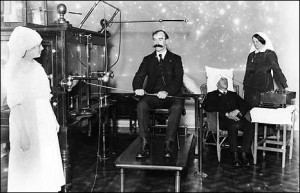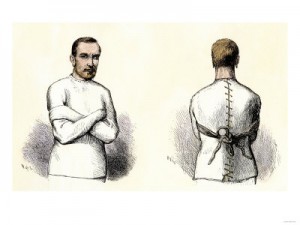
"When the woman expostulated, the maniac threw fragments of crockery at her and finally she fled from the house."
As you might expect, life was never boring at the Flatbush Insane Asylum during the 1880s-90s, as the following quintet of stories attests.
••••••••••
“Shocking Desecration Charged” (New York Times, September 11, 1893): “I heard something the other day,” said a Brooklyn woman to a reporter for The New York Times, “which I think should be made public. It was the story of what a certain doctor did who is employed in the Asylum for the Insane in Flatbush. My informant’s name I withhold for the reason that if I should give it to you a person related to him who is now employed in the asylum would certainly lose his place.
“My informant tells me that about a week ago an aged woman died at the hospital who had been there for a long time. According to the regulations of the institution, the doctor referred to, in company with others of the medical staff, viewed the corpse.
“The doctors were in a merry mood and made quite a lark of the inspection by cracking jokes about the body, and altogether behaving in an unseemly manner. Finally, as I am informed, one of the doctors took a cigarette out of his case and, approaching the bedside, said:
“‘Let’s give the old lady a smoke.’
“Immediately thereafter he pried open the lips of the corpse and placed the cigarette between them.
“‘How’s that, old gal?’ he exclaimed, and then all hands gathered about and made sport of what they saw.”
Dr. Tracey, physician in charge at the Kings County Insane Asylum at Flatbush, was seen by a reporter for The New-York Times and the foregoing statement was laid before him. At first his face flushed and then he gasped out:
“It’s false–a malicious falsehood!”
••••••••••
“A Lunatic Not Cured” (Brooklyn Daily Eagle, June 10, 1895): William Gatehouse of Livonia avenue, near Freeport street, was sent to the Flatbush Insane Asylum some time ago and on Saturday was discharged as cured. In the Gates avenue police court this morning Justice Harriman committed Gatehouse to jail and he will probably be sent back to the asylum again.
The man returned to his home Saturday night and behaved himself until yesterday afternoon. Then, as his wife completed setting the table for dinner, Gatehouse grabbed the cloth, pulled all the dishes on the floor, announcing that he wanted to play checkers. When the woman expostulated, the maniac threw fragments of crockery at her and finally she fled from the house.”
•••••••••••
 “Captain Rhinehart’s Double Life” (Brooklyn Daily Eagle, April 12, 1888): Captain Gilson Rhinehart, 59 years of age, a pilot on Roosevelt street ferryboats, was committed to the Flatbush Insane Asylum yesterday afternoon, by Judge Osborne, of the City Court, on the application of the Commissioners of Charities and Correction. Catherine E. Rhinehart, the wife of the demented man, made the petition for his incarceration. Drs. A.M. Burns and R.H. Stone examined him and pronounced him undoubtedly insane. He imagines that people are anxious to cut his throat, and thinks his feet are poisoned.
“Captain Rhinehart’s Double Life” (Brooklyn Daily Eagle, April 12, 1888): Captain Gilson Rhinehart, 59 years of age, a pilot on Roosevelt street ferryboats, was committed to the Flatbush Insane Asylum yesterday afternoon, by Judge Osborne, of the City Court, on the application of the Commissioners of Charities and Correction. Catherine E. Rhinehart, the wife of the demented man, made the petition for his incarceration. Drs. A.M. Burns and R.H. Stone examined him and pronounced him undoubtedly insane. He imagines that people are anxious to cut his throat, and thinks his feet are poisoned.
••••••••••
“The Insane Entertained” (Brooklyn Daily Eagle, September 9, 1896): At the Flatbush Insane Asylum, Labor Day was celebrated with a musical and dramatic entertainment and a base ball match, between a picked nine of the patients and the medical staff of the institution. The score of the patients was 23 and that of the medical staff 14. The game had been looked forward to by the patients with a great deal of joyful anticipation and it was witnessed by about four hundred male and female lunatics of the institution, who were on the grounds, and by many more from the windows of the wards who cheered and applauded the good play of both teams. The game was well played, particularly by the patients, who had been practicing for the event for some time.
••••••••••
“Vagaries of the Insane” (Brooklyn Daily Eagle, June 13, 1888): Chief Judge Clement, of the City Court, this morning committed the following demented persons to the Flatbush Insane Asylum:
William Brown, a sailor, 25 years of age. He imagines that he is an angel and has wings, but complains that devils pursue him and make him fly so much that he is tired.
Rose Boyle, 74 years of age, thinks she is only 26, and is of the belief that her husband goes to Ireland every night.
Louis Grobel, 60 years of age, imagines that he invented a clock that never stops and is in possession of an income of $1,000,000 a day.
Henry Hall, a bartender, 35 years of age, imagines himself to be a banker and a partner of Edward Stokes. He labors under the delusion that he owns yachts and merchant vessels.
